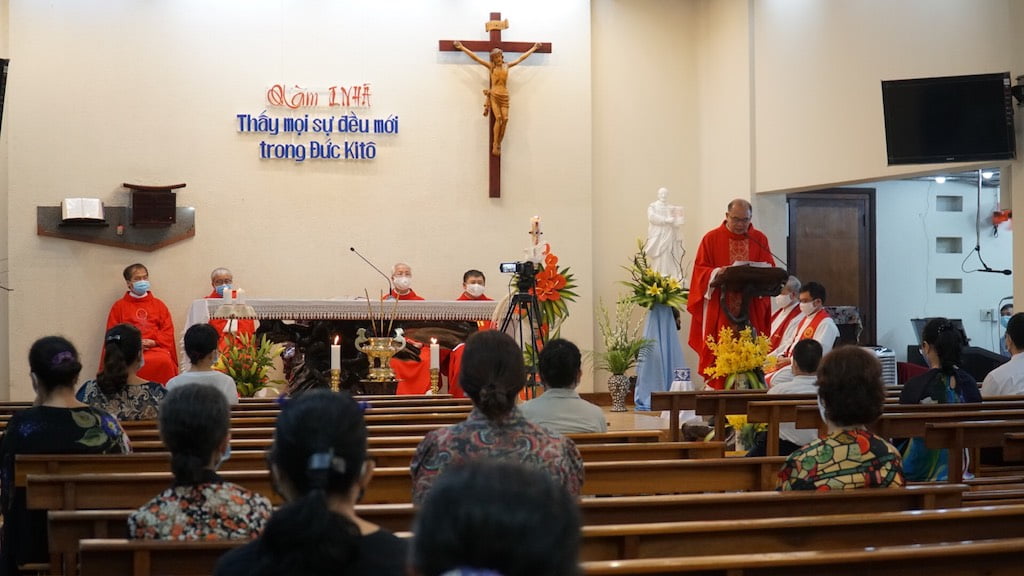
The Holy Spirit: The Transforming Agent for Vision and Mission

Jescom-VN
AMDG
Brothers and sisters,
Two of the three readings that we have just listened on the Feast of Pentecost today, which is also the day the Vietnam Jesuit Province has chosen as the opening day of the Ignatian Year, refer to the Holy Spirit being given to the Apostles. While the passage from the Gospel of John tells us that, right after his resurrection, Jesus appeared several times to the Apostles to give them the Holy Spirit and mission (Jn 20:21), the book of Acts presents The Holy Spirit was sent down on the Apostles while they were praying together with the Virgin Mary, and immediately they set out on a mission to proclaim the Good News to all nations (Acts 2:1-11). Thereby, we can say that the Holy Spirit is the transforming agent of vision and mission for the Apostles and Ignatius.
FOR THE APOSTLES
Transforming of Vision
Like the people of Israel, the Apostles always lived in expectation of the promised Savior, but earthly; even when Jesus was resurrected and was about to be taken up to heaven, the Apostles kept the hope of Israel’s theocracy: the restoration of David’s kingship (Acts 1:6-7). However, after receiving the Holy Spirit, the Apostles changed their perspective and realized that it was Jesus who fulfilled the prophecy through his death and resurrection (Acts 2 : 30-31; 3 : 22; 4 :10) and therefore “there is no salvation in anyone else; for there is no other name under heaven given to mankind… by which we must be saved” (Acts 4:12).
Transforming of Mission
If previously the Apostles refused to participate in the destiny of Jesus, their Master, who had to go through the way of the cross (Mk 8:31), now, after receiving the Holy Spirit, they rejoiced and openly preached to the Jews: “God has made him Lord and Christ Jesus, whom you have crucified” (Acts 2:36). They were all convinced that it was their mission to preach about the risen Jesus. Paul emphasizes even more when he asserts that “Woe to me if I do not preach the Gospel” (1 Cor 9:16).
Motivation for action: Committing oneself to the building of the mystical Body of Christ
With the Holy Spirit, the Apostles’ fear, avoidance and refusal to enter the way of the cross give way to their commitment to the mission of evangelization and building up the Church. Indeed, when they were forbidden by the authorities to teach about the Name of Jesus, they were not afraid, but also affirmed that “We must obey God rather than men”. Thus, the Apostles “filled all Jerusalem with the doctrine of the Risen One” (Acts 5:28). Ill treated and persecuted, they feel “delighted to be deemed worthy to suffer shame for the name of Jesus” (Acts 5:41) and “nothing can separate us from the love of God manifested in Christ Jesus… They assert that “whatever fate may be, it is good to be as long as Christ is preached” (Philippians 1:18). Jesus became their way of life, as Paul shared: “For me to live is Christ” (Phil 1:21).
Thus, Jesus’ promise to the Apostles that “when the Spirit of truth comes, he will guide you into all the truth” has come true (Jn 16:13). With the Holy Spirit, the Apostles have reached to the ‘peak’ of purification of vision and mission and reached the inner unity of vocation and mission that Jesus expected.
FOR IGNATIUS
Today, Vietnam Jesuit Province, in communion with the Universal Society, inaugurates the Ignatian Year, celebrating the 500th anniversary of the his conversion after being mortally wounded and defeated in a life-and-death battle between imperial troops of Spain and France at Pamplona, on the second day after Pentecost, May 20, 1521.
The purpose of the celebration of Ignatian Year is that the Jesuits want to remember the special moment in which the Holy Spirit inspired Ignatius in his decision to follow Christ and want to dig deeper into his pilgrimage path in order to ‘drawing spiritual benefits’ to live and practice the Universal Apostolic Preferences chosen by the Society. The Ignatian year will begin on May 20, 2021, and will end on July 31, 2022.
In studying his events and the life of pilgrimage, we can discover three fundamental dimensions of the conversion that Ignatius received.
Conversion of Vision
Saint Ignatius, baptized Ignigo, belongs to the Basco minority, born in 1491 in Northern Spain, belongs to the aristocratic class, professionally trained in chivalry to serve the king and the Western court of Spain. With the mettle of a knight with the qualities of “knowing”, “wise”, “skilled”, “good at swords and horses”, “clever”, and especially “loyalty”, Ignatius went into battle against the invading French army and was shot in the leg! The brave battle at Pamplona in 1521 was certainly not for the sake of God and the Church, but it was “a battle for the king, honor and glory,” that is to say, for himself, as Father Nadal writes. Ignatius himself admits that “until the age of 30 he was a man who was absorbed in worldly vanity”.
However, everything changed after the time of convalescence in Loyola. Though still thinking about fame and excited at the thought of pleasing ladies, Ignatius began to experience that these things brought him only superficial, fleeting, and empty pleasures; on the contrary, the joy was deep, long and lasting as he meditated on the example of the saints who served Christ; he was motivated to imitate Francis and Dominic in the service of Christ. That experience led him to a landmark decision: instead of being a knight in the service of the king and court of Spain, he aspired to be a knight in the service of Christ. A new perspective opened up with the life of the knight named Ignatius.
Conversion of Mission
Conversion of vision leads to conversion of mission. To achieve this, God gradually taught Ignatius like a teacher teaching a child. Indeed, Ignatius was motivated towards a self-purification through an outwardly ascetic lifestyle (walking barefoot, eating only bread and vegetables, drinking merely water, wearing beggar’s clothing) and through strict inner spiritual practices (long prayer, attendance at Mass and liturgy, fasting…). Ignatius became like a true pilgrim.
Although he felt joy with his new life, God wanted to lead Ignatius further on the path of virtue by letting him pass through the spiritual darkness: no consolation, confusion over past sins, anxiety about future, causing him to at times become discouraged and want to commit suicide. Not knowing where to turn, he could only patiently appeal to God.
After the dark night of faith, God gave him the gift of understanding the truths of faith: about God, the Trinity, Creation, Redemption, the Eucharist and the Church; and in Cardoner, he was given intense supernatural light to confirm the truths of the faith taught earlier and at the same time, the conviction of his apostolic vocation to cooperate with Jesus in God’s saving plan. With this illumination, Ignatius’ supernatural vision of the world and history was shaped, and at the same time transformed him from wishing to live an ascetic life as a hermit to sacrificing himself to help souls.
To serve souls better and more effective
Ignatius’ ideal of “serving Christ” and his mission of “helping souls” are confirmed in a vision at La Storta in mid-November 1537: God the Father pointed to Ignatius and said to Jesus carrying the cross: “I want you to accept this person to serve you.” Then the Son said to Ignatius: “I want you to serve us.” This ideal and mission dominated the entire life and commitment of the saint and the Jesuits later.
Since he was not allowed to stay in Jerusalem to help souls (after the pilgrimage), on his way back to Spain, Ignatius asked himself: “What should I do?”. The answer has been given: to serve souls better and more effectively it is necessary to do 3 things: one, must find like-minded people to share the vision and mission; two, must be resolutely committed to learning; and third, all apostolic activity must be under the guidance and direction of the Church, through the Vicar of Christ on earth.
Brothers and sisters,
Golgotha (the Hill of Skulls) with the death of Jesus is a dark memory that could not be darker for the Apostles! However, things changed when Jesus resurrected and gave them the Holy Spirit. With the Paraclete, the Apostles “saw all things new in Christ” through an inner renewal of vision and mission, and then they devoted themselves wholeheartedly to building up the mystical body Christ as witnesses to the Gospel.
‘Pamplona’ marks the defeat of the courageous and proud a knight, Ignatius, with the ideal of serving the king and the court of Spain! However, Ignatius’ “unwilling memory” at Pamplona was the beginning of a “journey that must always be mentioned” as God built for the knight named Ignatius a new vision and a new mission to serve the Living King and His Kingdom. With the grace of conversion, Pamplona is no longer a dark night, because it gave Ignatius a new horizon: ‘seeing all things new in Christ’.
“Serving Christ by helping souls under the guidance of the Church” is seen as the fruit of the conversion that Ignatius received from the Pamplona event and it is the origin and foundation of the Society of Jesus.
What we can benefit from today’s celebration of Pentecost and the Ignatius Year is an invitation to all of us to ask for the grace of conversion to practice radical conversion, on personal, communal and institutional levels, as well as the conviction that a radical conversion is possible in the Spirit. Radical conversion will help the vision of each individual, of the Society to be renewed and clear; and at the same time it helps the apostolic mission of the Society and each individual become effective when engaged in practicing the Four Universal Apostolic Preferences of the Society: “helping others to come to God, caring for the poor and abandoned, accompanying young people and taking care of our Common house”.




